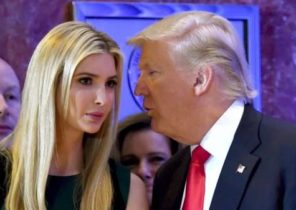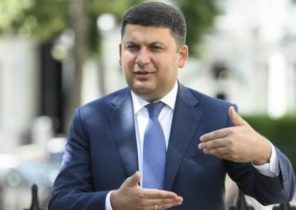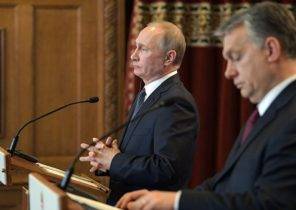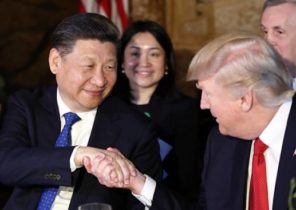
It is quite obvious that threatening Russia with U.S. sanctions will not force Moscow, as optimistically suggested last week the Secretary of state Rex Tillerson (Rex Tillerson), to try to improve relations with Washington. On the contrary, the sanctions, the law which is not even signed, has pushed the Kremlin to end a unilateral truce with America, which has continued since the election of Donald trump, and strike back at American interests. Last Friday, Russia said that it would deprive the United States of two objects of diplomatic property, and would require reducing the staff of the American Embassy. Sunday proved that she is serious. September 1, the Embassy should lose 755 out of 1200 employees. It comes as diplomats and ordinary staff.
Of course, this is a serious action. But Vladimir Putin is behaving not as the man, completely missing the relationship with America. The decisions taken last weekend was a demonstration of anger — but not spontaneous, but conscious. Putin emphatically chose the target of the American government, instead of working in Russia, American business and, separately, made clear that while he does not plan to impose other restrictions against American interests. Probably, before to solve, what is the next step, he wants to see how to work the law on sanctions in practice.
The Russian President has never hesitated to aggressively speak against perceived enemies of Russia in the United States. So last week during a visit to Finland, he called the bill on sanctions “unacceptable” and stated that this practice “destroys international relations and international law”. However, he definitely does not want to burn all bridges.
Putin now views the United States as a country that is experiencing three crises of colossal magnitude. The first of these is the cold war between trump and his opponents, almost paralyzed the American government. The second — even more important — is the continuing conflict between the rich elites and the large part of the American people, the standard of living which for decades remained at the same level. If the first of these conflicts can be resolved in the coming years as a result of impeachment or new elections, the second resolution will require much more time. The third crisis affects U.S. foreign policy. It is a conflict between those who seek to preserve America’s global leadership, and those who would prefer to abandon it. This conflict is likely to be most enduring, and while the United States will not decide which country they want to be on those three fronts, we can expect that the Russian President will continue to be cautious.
2016 elections and their consequences not only surprised analysts but also allowed to understand about the United States something important. The American political establishment, the last 120 years the remaining sample of self-confidence and firmness, began to lose confidence. On a falling self-esteem of the elites point their confusion, their belief in the vulnerability of American democracy to external interference and their deep-rooted suspicions about collusion of the elected President and his entourage with a foreign power. The constant fears of the establishment that the Russian propaganda in the face of such little-known in America media like RT and Sputnik, can affect the public mood in the United States, demonstrates his distrust of the American voters.
The election trump also exacerbated the already unfolding by the time the crisis of American foreign policy. The United States began to withdraw into ourselves after the disastrous presidency of George W. Bush. The retreat began even Barack Obama. Trump only continued him in his characteristic experimental style. Of course, a certain difference between their tactics there is: if Obama was trying to mask the withdrawal of the US inspired and supported by America international initiatives, the nationalist trump abandoned the disguise.
Putin, a former KGB officer, cannot ignore these circumstances. A country suffering simultaneously from multiple crises, insecure and confused, of course, dangerous. From the point of view of Putin, the current inter-political conflicts led to the fact that the Russian theme has become a weapon in the hands of the opponents of the trump. However, even when the current political crisis is resolved, Russia will call in the United States hostility, at least in the next decade. The American President, faced with political difficulties, can always take up arms and strike on foreign enemies to improve your prospects inside the country. If bill Clinton bombed Iraq during the hearings on his impeachment, why would Donald Trump not to follow his example? He already did in Syria, in which Russia is deeply involved, and may again do so in North Korea, bringing full scale war to the far East borders of Russia. The Kremlin, deciding what should be its policy towards America should take all this into account.
Amid the current chaos to countries that are perceived as competitors of the USA on the world stage, it makes sense to allow America to focus on domestic issues, and by secretly implement their own plans, all the forces avoiding direct conflict with the still incredibly powerful global hegemon. Exactly what works China. For Russia it would also be a reasonable choice. However, Moscow’s actions in Ukraine and later in Syria and last year’s hacking of the National Committee of the Democratic party led to growing confrontation with the United States, which does not allow Russia to quietly stand aside and achieve their goals. In such circumstances, a viable option look careful and limited contractee.
Putin publicly acknowledges that real improvement in U.S.-Russian relations in the foreseeable future impossible. Trump and Tillerson can hold long and meaningful conversations with Putin and foreign Minister Sergei Lavrov, but the question is how these conversations will be productive. A powerful coalition that includes the U.S. Congress, Department of defense, the intelligence community and most of mainstream media decided that Russia must be pressed, until it breaks. Sanctions, the law which will be signed soon, will definitely not be the last.
Putin this weekend made gently. In the coming months, it should maintain the same cautious course. He is acutely aware of the disparity of forces between Russia and America. He knows that the arms race with the United States undermined the Soviet economy and its repetition can kill a Russian. Most likely, it also takes into account that the self-isolation that would result from sanctions against Western companies, it will be much worse for Russia than any us attempts to isolate Russia from the outside. He probably sees that the fanning of xenophobia and anti-Americanism in the country will not bring Russia any good, but it will spoil its relations with other States — not only with the United States — and even more complicate its development. The Soviet Union attempted to cooperate with the United States as an equal —in the absence of equality — and in the end left the stage. The Russian Federation starting from a weak position, have to be smarter. Putin as a judoka is, of course, understands.
To be smarter, Russia should carefully choose targets for their policies on the American direction and send different players different signals. It’s one thing to strike back at the interests of the American government, quite another to harm the interests of U.S. business in Russia. Russia needs to cooperate with the us military, but it should be understood that this process may be only one goal — to prevent a direct clash between armed forces of two nuclear powers. The U.S. intelligence community will remain the enemy, as it was during the cold war. However, at some point the need to do something with growing mutual cyberthreats will have to bring opponents to the negotiating table.
Between cold war and current us-Russian confrontation there are many important differences. It is important that the conflict covers the political and public sphere. Russia needs to continue to be outside the sanctions regime — was less affected by trade, scientific and technological cooperation and cultural and humanitarian ties. Russia conflict (for the most part) with Washington, not with the rest of the United States. The dispute, in essence, is about the world order and the place and role of America and Russia in it. Resolution to this conflict will not as a result of confrontation between the US and Russia, as a result of what will take place inside both countries. It is also important what you will be able to achieve the other players — primarily China, but also Europe, and India, and so on. Maybe someday America and Russia will cease to be adversaries and become “normal” — albeit unequal — rivals. But for the world it is imperative that in the process they accidentally become real enemies.







